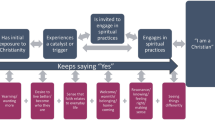Abstract
This study attempts to derive the empirically based typology of religious conversion by means of cluster analysis. The research sample consisted of 179 participants who defined themselves as converts. The participants were administered the Religious Conversion Process Questionnaire (RCPQ), which contains 50 items reflecting dominant aspects and theories of conversion. In the first phase of analysis, hierarchical cluster analysis of items was used to identify core dimensions of the questionnaire. The items were sorted into 14 clusters (e.g., positive emotions during conversion, meaning-searching process, influence of other people, long-term and calm conversion, etc.). In the second phase, a two-step cluster analysis (hierarchical cluster analysis optimized by non-hierarchical k-means cluster analysis) was used to determine the types of religious conversion. Five types were derived, some of them clearly corresponding to the conversion types identified in previous theoretical and empirical studies (e.g., compensatory conversion).

Similar content being viewed by others
References
Asendorpf, J. B., Borkenau, P., Ostendorf, F., & van Aken, M. A. G. (2001). Carving personality description at its joints: confirmation of three replicable personality prototypes for both children and adults. European Journal of Personality, 15, 169–198.
Dawson, L. (1990). Self-affirmation, freedom, and rationality: theoretically elaborating “active” conversion. Journal for the Scientific Study of Religion, 29, 141–163.
Gooren, H. (2007). Reassessing conventional approaches to conversion: toward a new synthesis. Journal for the Scientific Study of Religion, 46, 337–353.
Granqvist, P. (2003). Attachment theory and religious conversion: a review and resolution of the classic and contemporary paradigm chasm. Review of Religious Research, 45, 172–187.
Granqvist, P., & Kirkpatrick, L. A. (2004). Religious conversion and perceived childhood attachment: a meta-analysis. International Journal for the Psychology of Religion, 14, 223–250.
Halama, P., & Halamová, J. (2005). Process of religious conversion in the Catholic charismatic movement. Archive for the Psychology of Religion, 26, 69–91.
Hood, R. W., Jr., Hill, P. C., & Spilka, B. (2009). The psychology of religion: An empirical approach (4th ed.). New York: Guilford Press.
James, W. (1930). Druhy náboženské zkušenosti [Varieties of religious experience]. Prague: Melantrich. (orig. published in 1902).
Kahn, P. J., & Greene, A. L. (2004). “Seeing conversion whole”: testing a model of religious conversion. Pastoral Psychology, 52, 233–258.
Kirkpatrick, L. A. (1997). A longitudinal study of changes in religious belief and behaviour as a function of individual differences in adult attachment style. Journal for the Scientific Study of Religion, 36, 207–217.
Kirkpatrick, L. A. (1998). God as a substitute attachment figure: a longitudinal study of adult attachment style and religious change in college students. Personality and Social Psychology Bulletin, 24, 961–973.
Kirkpatrick, L. A., & Shaver, P. R. (1990). Attachment theory and religion: childhood attachments, religious beliefs and conversion. Journal for the Scientific Study of Religion, 29, 315–334.
Köse, A., & Loewenthal, K. M. (2000). Conversion motifs among British converts to Islam. International Journal for the Psychology of Religion, 10, 101–110.
Kuczkowski, S. (1998). Psychologia religii. Kraków: WAM.
Lofland, J., & Skonovd, N. (1981). Conversion motifs. Journal for the Scientific Study of Religion, 20, 373–385.
Long, T. E., & Hadden, J. K. (1983). Religious conversion and the concept of socialization: integrating the brainwashing and drift models. Journal for the Scientific Study of Religion, 22, 1–14.
Meadow, M. J., & Kahoe, R. D. (1984). Psychology of religion. New York: Harper & Row.
Paloutzian, R. F. (1981). Purpose in life and value changing following conversion. Journal of Personality and Social Psychology, 41, 1153–1160.
Paloutzian, R. F. (2005). Religiouos conversion and spiritual transformation? A meaning system analysis. In R. F. Paloutzian & C. L. Park (Eds.), Handbook of the psychology of religion and spirituality (pp. 331–347). New York: Guilford Press.
Pargament, K. I. (1997). The psychology of religion and coping. New York: Guilford Press.
Rambo, L. R. (1992). The psychology of conversion. In H. N. Malony & S. Southard (Eds.), Handbook of religious conversion (pp. 159–177). Birmingham: Religious Education Press.
Rambo, L. R. (1993). Understanding religious conversion. New Heaven: Yale University Press.
Rammstedt, B., Riemann, R., Angleitner, A., & Borkenau, P. (2004). Resilients, overcontrollers, and undercontrollers: the replicability of the three personality prototypes across informants. European Journal of Personality, 18, 1–14.
Richardson, J. T. (1985). The active vs. passive convert: paradigm conflict in conversion/recruitment research. Journal for the Scientific Study of Religion, 24, 119–236.
Snow, D. A., & Machalek, R. (1984). The sociology of conversion. Annual Review of Sociology, 10, 167–190.
Starbuck, E. D. (1901). The psychology of religion. London: Walter Scott. (orig. published in 1899.)
Tippet, A. R. (1992). The cultural anthropology of conversion. In H. N. Malony & S. Southard (Eds.), Handbook of religious conversion (pp. 192–205). Birmingham: Religious Education Press.
Vergote, A. (1966). Psychologie religieuse. Brussels: Charles Dessart.
Zinnbauer, B. J., & Pargament, K. I. (1998). Spiritual Conversion: a study of religious change among college students. Journal for the Scientific Study of Religion, 37, 161–180.
Author information
Authors and Affiliations
Corresponding author
Rights and permissions
About this article
Cite this article
Halama, P. Empirical Approach to Typology of Religious Conversion. Pastoral Psychol 64, 185–194 (2015). https://doi.org/10.1007/s11089-013-0592-y
Published:
Issue Date:
DOI: https://doi.org/10.1007/s11089-013-0592-y




